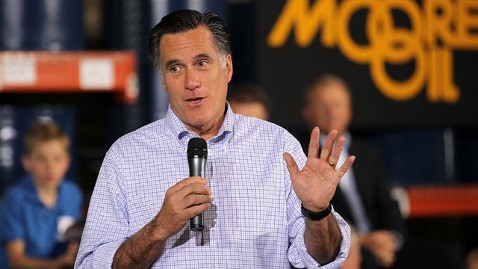Romney Leans on Wisconsin's Well-Off

Justin Sullivan/Getty Images
Updated at 10:15 p.m. ET
Mitt Romney again relied on well-off voters for a Midwest victory, leaning in Wisconsin on support from those with $100,000-plus incomes while running only about evenly against Rick Santorum among those less comfortable financially.
In Maryland, Romney earned a more emphatic victory. And in both states he was competitive even in groups in which he's often fared less well, particularly in the South, including very conservative and evangelical voters alike.
Romney ran especially strongly among the majorities focused chiefly on electability and experience, his usual strong suits. And he benefitted from a broad sense of inevitability: Whatever their preference, 80 percent in Wisconsin said they expected him to become their party's eventual nominee. Fewer, but 65 percent, also said they'd be satisfied with that outcome.
Still, he had his challenges. Wisconsin voters with incomes less than $100,000 split essentially evenly between Romney and Santorum, 38-37 percent, much as they had previously in Illinois (42-39 percent) and Michigan (36-40 percent). Here, as in those states, Romney needed better-off voters to make the difference, winning $100,000-plus voters - about a quarter of the electorate - by 22 percentage points.
Santorum, the darling of very conservative voters in the South, only about split them with Romney in Wisconsin. And in an unusual result Santorum also ran competitively in Wisconsin among moderate and liberal voters; the reason was a large turnout among independents and some Democrats in the state's open primary. They accounted for about four in 10 voters, disproportionately were moderates or liberals, and backed Romney in far lesser numbers than did mainstream Republicans.
There were other challenges for the GOP frontrunner in the exit poll results, analyzed for ABC by Langer Research Associates. Just 37 percent in Wisconsin characterized Romney as "about right" ideologically," fewer than the 44 percent who called him "not conservative enough." And Santorum, as in the past, won broadly among the more than four in 10 voters who were focused chiefly on the "true conservative" or on "strong moral character" in a candidate.
Nonetheless, more than half in Wisconsin instead were chiefly focused either on the candidate who can best defeat Barack Obama, or on experience. Romney won electability voters by a vast 49-point margin, and those prioritizing experience by 36 points.
Romney ran competitively among groups he's lost in states farther to the south. He was close to Santorum even among evangelicals and very conservatives in Wisconsin, two groups that had lifted Santorum to Southern victories. And there were fewer of them: Fewer than four in 10 voters either in Maryland or Wisconsin described themselves as evangelicals, compared with 61 percent in Louisiana and an average of 53 percent in all GOP primaries to date.
Additionally, about three in 10 in Wisconsin and Maryland called themselves very conservative, compared with 49 percent in Louisiana, where Santorum thumped Romney in their last match. And just 25 percent in Wisconsin were strongly focused on a candidate who shares their religious beliefs, again far fewer than in many Southern states.
In one question not asked previously, Romney ran barely ahead of Santorum in trust among Wisconsin voters to handle health care policy, 35 to 30 percent - a competitive showing for Romney given his vulnerability on the issue among voters critical of the mandatory coverage law he signed as governor of Massachusetts.
Maryland was writ larger for Romney. He won 74 percent of the voters who said beating Barack Obama was the key attribute, and 66 of those focused chiefly on experience, the latter 11 points better than his tally in this voter group in Wisconsin. He won resoundingly among somewhat conservative and moderate voters, while splitting very conservatives with Santorum. And while Romney won $100,000-plus voters by 29 points, he also won less well-off Maryland voters by 20 points, a feat he failed to replicate with his less broadly based victory in Wisconsin.
By Gary Langer, with Gregory Holyk and Damla Ergun.